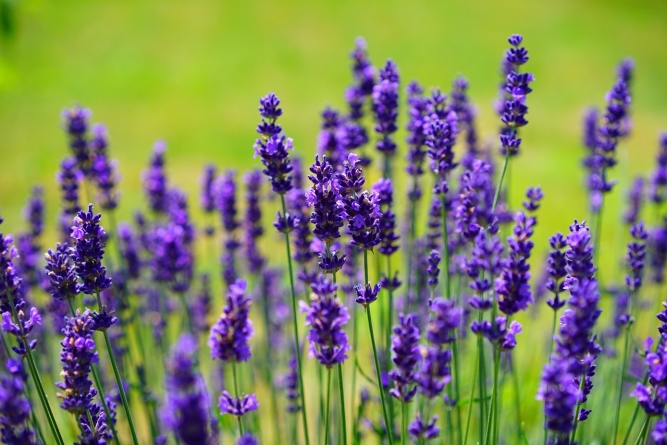Lavender offers diverse health benefits, such as easing anxiety and depression and promoting skin well-being. It can be ingested as tea or capsules, applied topically, or utilized in aromatherapy.
Lavender is commonly known for its fragrance and color, yet its flower and derived oil have rich histories in herbal medicine. The term “lavender” originates from the Latin word “lavare,” meaning “to wash.” Lavender’s historical use traces back to ancient Egypt, where its oil was used in mummification.

In subsequent eras, lavender became a popular addition to baths in various cultures, including ancient Persia, Greece, and Rome. These societies believed in lavender’s ability to cleanse both the body and mind.
Explore further to discover the manifold health advantages offered by lavender in its diverse applications.
Health Benefits of Lavender
Throughout history, lavender has been utilized to alleviate symptoms and provide support for various conditions. Many of its health benefits have been validated by modern science, while others are still being explored.
Lavender has shown potential in addressing the following issues:
Insomnia
In ancient times, lavender was recommended for those struggling with insomnia. People used lavender-filled pillows to aid sleep and improve rest. Current research indicates that inhaling lavender’s aroma might enhance sleep quality. A 2014 systematic review of 15 studies found that inhaling essential oils, including lavender, had positive effects on people with mild sleep disturbances. Smaller studies also demonstrated lavender’s benefits, with research from 2015 indicating that lavender aromatherapy users felt more refreshed upon waking. Additionally, a 2010 study involving individuals with anxiety disorders showed that orally administered lavender oil helped them sleep longer at night.
Lavender May Help with Hair Loss
Applying lavender oil topically might be beneficial in treating alopecia areata, a condition that leads to hair loss in patches.
An older study from 1998, involving 86 individuals with alopecia areata, revealed promising results. When participants massaged a blend of essential oils (thyme, rosemary, lavender, and cedarwood) mixed with carrier oils into their scalp daily for seven months, 44 percent experienced improved hair growth. However, it’s challenging to pinpoint whether lavender oil specifically contributed to this growth.
Furthermore, a more recent animal study conducted in 2021 demonstrated that lavender oil effectively stimulated hair growth within a 28-day period, adding to the potential benefits of using lavender oil for hair-related issues.
Lavender May Help Cure Headaches and Migraine
The soothing properties of lavender could potentially alleviate headaches and migraines.
A 2016 study observed that individuals with migraines who underwent three months of lavender therapy scored lower on a headache assessment scale compared to a control group.
Additionally, a 2012 study involving 47 participants with migraines found that inhaling lavender essential oil for 15 minutes resulted in reduced headache severity and frequency.
Lavender Might Help Control Anxiety
Lavender could be beneficial for individuals dealing with anxiety.
A comprehensive meta-analysis in 2019 revealed that individuals with anxiety disorders who consumed 160-milligram lavender oil capsules experienced notable reductions in anxiety levels.
Additional research studies have supported these findings. For instance, a 2015 study conducted with 60 individuals in a coronary intensive care unit demonstrated that those treated with lavender essential oil exhibited lower anxiety levels and improved sleep.
Furthermore, a 2010 study compared lavender capsules to the anti-anxiety medication lorazepam, concluding that lavender’s effects were comparable to the prescription drug.
Chemotherapy side effects
As per the National Cancer Institute, aromatherapy proves beneficial for individuals undergoing cancer treatment by assisting in managing treatment-related side effects. Specifically, lavender aromatherapy has been found to reduce anxiety associated with cancer treatment procedures.
Depression
Although lavender’s impact on depression is not as extensively studied as its effects on anxiety, research in this area is promising.
A small 2016 study involving postpartum women discovered that lavender aromatherapy effectively prevented stress, anxiety, and depression after childbirth.
In a separate 2015 study focusing on individuals with kidney disease, participants who inhaled a lavender scent for one hour during hemodialysis exhibited lower levels of depression and stress compared to those who did not.
Moreover, in a small 2020 study involving older adults, individuals who consumed lavender tea twice a day for two weeks reported reduced levels of anxiety and depression.
Burns
Lavender has a rich history as a traditional treatment for burns, and certain older studies have indicated scientific support for this practice. A 2009 study revealed that lavender’s antimicrobial properties could potentially aid in preventing infections following burns.
Skin Conditions
Lavender contains two compounds, linalool and linalyl acetate, known for their anti-inflammatory properties. A study from 2020 indicates that these compounds could offer relief for various skin problems, including eczema, dermatitis, psoriasis, itching, and rashes.
Wound Healing
Lavender’s calming properties could potentially aid in the healing of injured skin. A comprehensive review of 20 studies revealed that lavender oil accelerated wound healing, encouraged collagen growth, and enhanced the skin’s tissue remodeling process.
The many uses of lavender in all its forms
Lavender serves multiple purposes, benefiting people’s health and well-being in various ways such as:
- Dried Flowers
- Essential Oil
- Topical Oils
- Capsules
- Teas, Tisanes, and Infusions
- Creams, Lotions, and Salves
- Beauty Products
People utilize lavender in these forms to enhance their overall health and wellness.
Conclusion
As per the National Center for Complementary and Integrative Health, consuming lavender in typical food quantities is generally safe. So feel free to indulge in lavender-infused treats like tea, muffins, or honey!
Using short-term oral supplements like lavender capsules is also considered safe. However, when it comes to applying lavender as a topical oil, its safety depends on your skin’s sensitivity. Some individuals might experience allergic reactions after using lavender oil on their skin. It’s essential to always dilute it with a carrier oil and perform a patch test before applying lavender directly to your skin.
For individuals who are pregnant or breastfeeding, more research is necessary to establish the safety of lavender usage. If you fall into these categories, it’s advisable to consult your doctor before starting any lavender-based treatment.